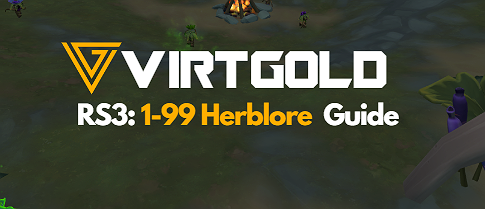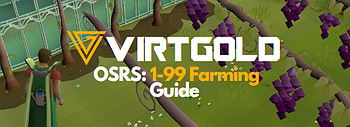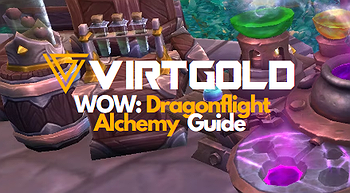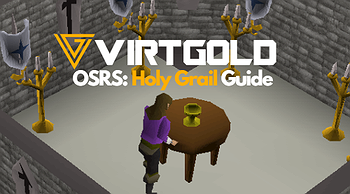RS3 Herblore Guide
Herblore is a skill in RuneScape 3 (RS3) that allows players to create various potions using herbs and other ingredients. Potions can provide valuable boosts to combat, skills, and other aspects of the game. In this comprehensive guide, we will cover the most efficient and cost-effective methods to reach level 99 in Herblore. This guide assumes you have basic knowledge of the game mechanics and the Grand Exchange.
Important Items and Tools
These items are essential for creating various potions and achieving efficient training:
1. Herbs:
Herbs are the core ingredient for making potions in Herblore. Different herbs have different effects and levels required to use them. They can be obtained through various methods, including:
Farming: Grow herbs at the Farming patches and harvest them when fully grown. Higher Farming levels will increase your chances of getting more herbs per patch.
Drops: Some monsters drop herbs as loot. Higher-level monsters have a better chance of dropping higher-tier herbs.
Grand Exchange: Purchase herbs from other players on the Grand Exchange. The prices fluctuate, so make sure to check for the best deals.
Some common herbs used for training Herblore are Guam, Tarromin, Harralander, Ranarr, Snapdragon, and Fellstalk.
2. Vials of Water:
Vials of Water serve as a base for most potions. To obtain them, you can:
Buy from Shops: General stores and other NPCs may sell vials of water.
The stock is usually limited, so check multiple shops.Glassblowing: Use a Glassblowing pipe with Molten Glass (made from Soda Ash and a Bucket of Sand) to create empty vials, then fill them with water from various sources, like fountains or wells.
3. Secondary Ingredients:
Secondary ingredients are combined with herbs to create potions. Each potion requires a specific secondary ingredient. Some examples include:
Eyes of Newt: Used in low-level attack and strength potions.
Unicorn Horns: Used in various higher-level potions, like antipoisons and super antifires.
Red Spider's Eggs: Used in super restores and weapon poisons.
Mort Myre Fungi: Used in super energy potions.
Chocolate Dust: Used in energy potions.
The Grand Exchange is a convenient place to buy these secondary ingredients.
4. Pestle and Mortar:
A Pestle and Mortar is a tool used to grind some ingredients into a finer form, which is necessary for certain potions. For example:
Unicorn Horn Dust: Unicorn horns are ground into dust to make Unicorn Horn Dust, used in making antipoison potions.
Herblore Habitat (optional): Completing the Herblore Habitat activity in the Karamja area unlocks access to special herbs like Wergali and Ugune. These herbs can be helpful for training Herblore and are often used in high-level potions.
Portable Well (optional): The "Portables" friends chat can provide a 10% experience boost when making potions on a Portable Well. Portable Wells are temporary, portable locations where players can perform various activities, including Herblore. Keep an eye out for announcements in the "Portables" friends chat or use the "Portables" FC Finder to find a Portable Well location.

These items and tools are crucial for training Herblore effectively and efficiently. As you progress through the levels, you'll encounter more complex and valuable potions to create, each with its own specific ingredients and uses. Remember to plan ahead, purchase ingredients wisely, and take advantage of any available boosts or bonuses to make the most of your Herblore training.
Leveling 1-99
Level 1-3:
The quickest way to reach level 3 is to make Attack Potions. Use Guam herbs with Vials of Water. You can make approximately 1,000 of these potions, and you will only need a few herbs and vials.
Level 3-26:
At level 3, make Strength Potions by using Tarromin herbs with Vials of Water. This is a fast and affordable method to reach level 26.
Level 26-38:
Continue making Strength Potions, but this time use Harralander herbs with Vials of Water. You can make around 2,000 of these potions to reach level 38.
Level 38-45:
Switch to making Serum 207 potions by combining Tarromin with Ashes. This method is slightly more expensive but faster than other alternatives.
Level 45-63:
Now, it's time to make Energy Potions. Combine Harralander herbs with Chocolate Dust. This method is reasonably fast and cost-effective.
Level 63-77:
At level 63, create Super Energy Potions by using Avantoe herbs with Mort Myre Fungi. This method might be a bit more expensive but is faster than alternatives.
Level 77-81:
From level 77, create Super Restore Potions by using Snapdragon herbs with Red Spider's Eggs. This is a great method to train Herblore while making a profit.
Level 81-88:
At level 81, make Prayer Renewal Potions by combining Fellstalk herbs with Morchella Mushrooms. This method may cost more but provides decent experience rates.
Level 88-99:
From level 88, create Overloads by combining the following potions:
Extreme Attack Potion: Use Avantoe herbs with Super Attack Potions.
Extreme Strength Potion: Use Dwarf Weed herbs with Super Strength Potions.
Extreme Defence Potion: Use Lantadyme herbs with Super Defence Potions.
Extreme Magic Potion: Use Ground Mud Runes with Super Magic Potions.
Extreme Ranging Potion: Use 5 Grenwall Spikes with Super Ranging Potions.
Additional Tips
1. Plan Ahead: Before starting your Herblore training, set clear goals and plan your journey. Decide if you want to focus on maximizing experience gains or if you want to make a profit while training. Having a clear plan will help you stay focused and make better decisions along the way.
2. Quests and Dailies: Some quests offer Herblore experience rewards. Completing these quests can give you a significant head start in your training. Also, consider doing daily challenges that reward Herblore experience. It's a great way to gain extra experience without much effort.
3. Utilize Portable Wells: As mentioned earlier, join the "Portables" friends chat and keep an eye out for Portable Wells. When you make potions on a Portable Well, you receive a 10% experience boost. This can save you time and money in the long run.
4. Scroll of Cleansing: Unlock the Scroll of Cleansing by participating in the Player-Owned Ports minigame. This scroll gives you a chance to save secondary ingredients when creating potions. It can significantly reduce the overall cost of training Herblore.
5. Use Clan Citadel Potion Making: Joining a clan with a Citadel's Potion Making plot can give you a small boost to experience when making Clan Citadel potions. This boost applies to regular potions as well, making it a useful bonus.
6. Double XP Weekends and Bonus XP: Keep an eye on special events like Double XP Weekends or Bonus XP opportunities. These events can greatly accelerate your Herblore training. Save up unfinished potions and ingredients to take full advantage of the bonus experience.
7. Make Unfinished Potions: Consider buying unfinished potions from the Grand Exchange and completing them. This method can provide extra experience, but it may not always be cost-effective. Be sure to calculate the cost per experience point to determine if it's worth it for your budget.
8. Buy Herbs in Bulk: If you have the financial means, buy herbs in bulk from the Grand Exchange. This can help you save money compared to buying herbs individually. Always check the Grand Exchange prices and buy at the right time.
9. Cleaning Herbs (Optional): Cleaning herbs is an alternative method to gain Herblore experience, but it is generally slower and more expensive compared to making potions. It's not recommended unless you have a specific reason for doing so, like ironman mode restrictions.
10. Combination Potions (Overloads): From level 88, focus on creating Overloads. Combining Extreme Attack, Strength, Defence, Magic, and Ranging Potions with Clean Torstol creates Overloads, which are powerful and highly sought-after potions. Making Overloads will give you both experience and a valuable end product.
11. High-Level Potions (Prayer Renewal and Super Prayer): Consider making Prayer Renewal Potions and Super Prayer Potions after Overloads. Prayer Renewals are useful for many high-level PvM activities, and Super Prayer Potions are valuable for restoring prayer points quickly.
12. Train Herblore During DXP Events: If possible, save the majority of your Herblore training for Double XP Weekends or Bonus XP events. This will significantly reduce the cost and time required to reach level 99.
13. Be Patient and Persistent: Herblore can be an expensive skill to train, especially at higher levels. Be patient and persistent, and don't get discouraged. Focus on steady progress and set achievable short-term goals.

Alternative Methods
Making Poison Bombs: This is an expensive but fast way to level up Herblore. You need to make 50,000 Poison Bombs to reach level 120. These bombs take 20 minutes to make and will give you a profit of 5-10M GP.
Herby Werby: At level 95, you can participate in the Herby Werby D&D for 200% experience.
Primal Extracts: You can make Primal Extracts at level 99 for 1.5M GP per hour.
How much does it cost to level up Herblore from 1-99 in RS3
The cost of leveling up Herblore from 1 to 99 in RuneScape 3 can vary depending on the methods used and the current market prices of the required ingredients. Here are the estimated costs based on the search results:
- According to the MMOGah guide, if you do the cheapest potions and exclude Overloads, the minimum cost for reaching level 99 Herblore will be around 52 million GP. This guide also mentions that it will take approximately 42-45 hours to reach level 99.
A Reddit post from 2022 estimates the cost of getting 99 Herblore to be around 300 million GP without any Double XP events.
The RPGStash guide mentions that Herblore is an expensive skill to train, but it does not provide specific cost estimates.
Ways to reduce the cost of leveling up Herblore in RuneScape 3
There are several ways to reduce the cost of leveling up Herblore in RuneScape 3. Here are some methods that can help:
Scroll of Cleansing: Obtaining and using the Scroll of Cleansing can reduce the cost of training Herblore. This scroll gives the player the Wasteless Herblore ability, which provides a 10% chance to save a secondary ingredient when making potions. It can be obtained from Dungeoneering rewards or purchased from other players.
Portable Wells: Utilizing Portable Wells whenever possible can significantly reduce the cost of training Herblore. Portable Wells provide a 10% chance to proc an additional potion when training Herblore, effectively doubling the output of potions. These wells can be found in the game during certain events or purchased from other players.
Boss Drops: Killing bosses like K'ril Tsutsaroth can provide valuable drops such as Grimy lantadymes, which can be used to make Antifire potions or Super magic potions. Gathering these drops yourself can save money on purchasing the required ingredients.
Gathering Your Own Resources: Growing your own herbs and gathering your own resources can help reduce costs. By doing so, you can avoid purchasing these materials from the Grand Exchange and instead sell the finished potions for profit. This method requires time and effort but can be cost-effective in the long run.
Market Research: Keeping an eye on the market prices of ingredients and potions can help you identify cost-effective opportunities. Prices can fluctuate, so it's important to buy ingredients when they are cheaper and sell potions when the prices are higher. This requires some market research and patience but can save you money in the long term.
Conclusion:
Herblore is a rewarding skill that can greatly enhance your gameplay experience in RuneScape 3. By following this 1-99 Herblore guide, you can efficiently and cost-effectively reach level 99 while creating useful potions for your adventures. Remember to be patient and persistent, as the skill requires some investment but offers great rewards. Good luck on your journey to becoming a master of Herblore!






